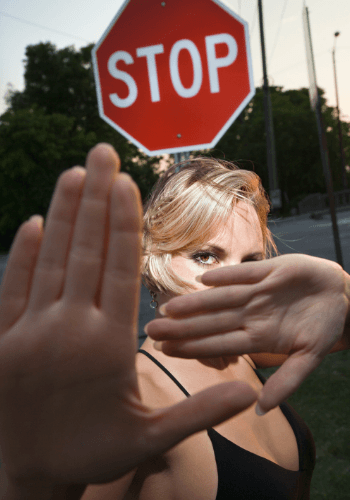This article is a must on your essential list of relationship resources.
Why?
Because when we mess up we whine. We pout. We dole out righteous indignation. Or we verbally punch back much too hard.
In other words, when we get confronted, we often get defensive.
And I do mean we, as in all of us. I honestly don’t know anyone, including myself, who hasn’t escalated a conflict by behaving or speaking in a defensive way.
It’s a fairly natural response…it just doesn’t do our relationships much good.
Let’s take, for example, a hypothetical married couple, Chris and Kelly, to see what defensiveness tends to look like in a relationship.
Defensiveness: A Typical Couple’s Response
Here’s the scenario:
Preparing for dinner out with Chris’s boss, the couple is running late. Kelly is in the shower while Chris is pacing, ready to go. He enters the bathroom.
Chris: “Oh, my god! I can’t believe we’re gonna be late again, Kelly! And this time it’s dinner with my boss. You just don’t give a damn, do you? You only care when it’s your thing. If it was dinner with your boss or with your parents you’d be on time.”
Kelly: “I don’t care?? I worked as fast as I could all day to rush home for your freaking dinner with your boss! We’re late because of me? If you got home and actually fed the kids, I wouldn’t have to get in the shower 30 minutes before we have to be there! And actually, we’re always late to everything because you do not get home on time. Ever.”
Chris: “Yeah, yeah, attack me! it’s your best weapon when you know you’re guilty!”
Wow.
One thing is sure, this conversation is going to end with both partners just pretending to be happy and hungry when they finally do see Chris’s boss at the restaurant.
So, what happened here?
Essentially, this all-too-common scenario is a perfect storm of circumstances, stressors, and unresolved resentment that fuel an onslaught of defensive conversation.
The circumstance
Their plans are for dinner with the boss. Even under the best conditions, this can make for some tension and anxiety. No question there.
The stressors
Both partners had to make special arrangements to be on time for an important dinner. And neither will be on time. Again, dinner with the boss is nerve-wracking. Especially if it feels like opportunities to make a good impression are slipping away as time ticks by. Feeling rushed or disregarded makes the upset worse. So stress is in the air.
The resentment
Clues to the unresolved issues and negative thinking are statements like, “You just don’t give a damn, do you? You only care when it’s your thing,” and “we’re actually always late to everything because you do not get home on time. Ever.”
All of that adds up to an ideal atmosphere for the storm clouds brewing Chris’s head.
Chris realizes they’re going to be late and engages negative thinking like,
“Why on earth is she not ready yet?”
“Doesn’t she understand this is my boss?”
“Does she even care? No, she obviously doesn’t!”
The fact that Kelly is still in the shower when he seeks her out just reinforces his own perceptions about how little she values him, his concerns, and his time.
Therefore, when he initiates the conversation, he’s already so flooded with negative emotions the attack readily spills out of him –and rains down on Kelly– as sarcasm, criticism, and blame.
Ouch. The result in Kelly? Yep… defensiveness.
What exactly is going on in Kelly? Why did she attack rather than apologize? Why do we react this way rather than fix things with each other? How could this kind of conflict be avoided or resolved?
Good questions. Let’s answer them.
Question #1: Why do we get so defensive?
Truthfully? Because we don’t want to be wrong.
According to The Gottman Institute:
“Research shows that defensiveness rarely has the desired effect of improving the situation. This is because defensiveness is really a way of blaming your partner. You’re saying in fact “the problem isn’t me, it’s you.” Defensiveness escalates the conflict, which is why it’s so destructive.
It’s not me, it’s you
 According to Dr. John Gottman, there are 4 Horsemen of the Apocalypse that can cause a major tear in a relationship. These relationship killers include Criticism, Defensiveness, Contempt, and Stonewalling.
According to Dr. John Gottman, there are 4 Horsemen of the Apocalypse that can cause a major tear in a relationship. These relationship killers include Criticism, Defensiveness, Contempt, and Stonewalling.
Defensiveness ranks high as a reaction to perceived judgment. Again, directly quoting The Gottman Institute (research of couples), “Defensiveness is an attempt to protect yourself, to defend your innocence, to ward off a perceived attack.”
We normally become defensive when we feel called out, criticized, or blamed for something. And a primary reason conflicts aren’t resolved quickly with the least amount of relationship fallout.
In the aforementioned scenario, Kelly felt attacked, so she is instantly defensive.
She used two approaches according to Gottman;
- Playing the Innocent Victim. In other words, Kelly first argued how hard she tried and innocent she was (she actually worked fast to rush home).
- Counter Attack. Kelly also determined that retaliation was justified. Since Chris attacked her with a verbal bomb (she “doesn’t give a damn” about his dinner), she hit back with a verbal nuclear bomb (he didn’t feed the kids; he ALWAYS makes them late to EVERYTHING because he NEVER comes home on time).
Alright. Now we can see clearly where things went wrong for our pretend couple and why many of us get so defensive in real life. Let’s consider the impact of defensiveness and how to keep this damaging reaction from becoming the norm.
Question #2: How does defensiveness influence your relationship?
This behavior does not prioritize your relationship or your partner. Again, defensiveness is destructive. What happens when you mess up but feel attacked? Do you insist on defending yourself instead of hearing your partner’s complaint? Then you may do more harm than good to your relationship.
Two not-so-good things are accomplished with a defensive response:
- Your partner feels even more strongly about their original complaint.
- They become defensive too, as a result of your attack.
Sadly, this can start an unfortunate slide toward upset, resentment and even Gottman’s third horseman of relationship apocalypse: Contempt.
You don’t want that. Instead, you need a plan for dodging the defensiveness trap.
Question #3: What can you do to avoid feeling defensive?
 Actually, it’s not too complicated.
Actually, it’s not too complicated.
The word of the day? RESPONSIBILITY.
If you can take at least some responsibility for the conflict, you can change the communication game entirely.
How’s that?
I always tell my clients that, even if you feel attacked, breathe deeply first. Shift your perspective a bit. See if you can take some responsibility for the interaction.
I promise it will not count against you! The goal is not to “beat” your partner or make them the loser! The communication game requires a win-win strategy that actually calms the conflict and prepares your partner emotionally for a different type of conversation with you.
Do what you have to do to preserve your connection. You can then defuse the tense circumstance, disable the stressors contributing to your miscommunication and deactivate the resentment switch that is flipped during a defensive reaction.
No blaming, attacking, defending, or resenting.
Rather, you begin the conversation by taking responsibility and then offer solutions from an open, loving place. Stay up late if you must. When all is said and done, you’ll feel connected and good about each other again.
Question #4: Does your defensiveness affect how your partner talks to you?
The short answer? Yes, of course!
If your partner feels heard and assured that you are able to take responsibility for your actions, especially those that have damaged trust and respect between you, they will feel safe to remain vulnerable with you. Thus, they’ll also remain more open to resolution and compromise.
However, if you remain defensive, you invite further disconnect. Is it really worth it?
Of course not! You love your partner. Demonstrate that you are willing to put your relationship before your need to be blameless. Chances are, tensions will deflate and real conversation will begin.
Let’s revisit Kelly and Chris. How could the scenario have gone differently?
Chris: “Oh my god, I can’t believe we’re gonna be late again! And this time it’s dinner with my boss. You just don’t give a damn, do you? You only care when it’s your thing. If it was dinner with your boss or with your parents you’d be on time.”
Kelly: (self-soothing by taking a breath) “I know I got in the shower later than I should have. It’s not okay that we’re late for your boss. I do realize how important it is for you. I promise to try harder to be more aware of the time.”
Husband: (defused of most of his anger) “I know you care, Kelly. I just got uptight about this. I’m sorry for attacking you. We’ll be late, but I love you!”
Hear the difference?
Wouldn’t you prefer to spend an evening with the husband in this situation than in the previous one? I know I would!
So, what have we learned about feeling defensive in your relationship?
- Defensiveness usually occurs when you’re attacked or criticized.
- Defensiveness comes in two forms:
- Playing the innocent victim
- Counter-attacking
- Defensiveness is destructive because it escalates the conflict.
- To avoid defensiveness, TAKE RESPONSIBILITY for some of the offending situation.
Next steps…
Defensiveness comes up time and time again in my session. So, I am hopeful this article will be super helpful to everyone in any type of relationship. Thank you for taking the time to read it!
Want more information? Please take a look at Four Horsemen of the Apocalypse – The Gottman Institute, a short video that explains how defensiveness, among other things, escalate relationship conflict.
Finally, for further help and support, please visit my page regarding improved communication or contact me for a consultation soon.
Heading


